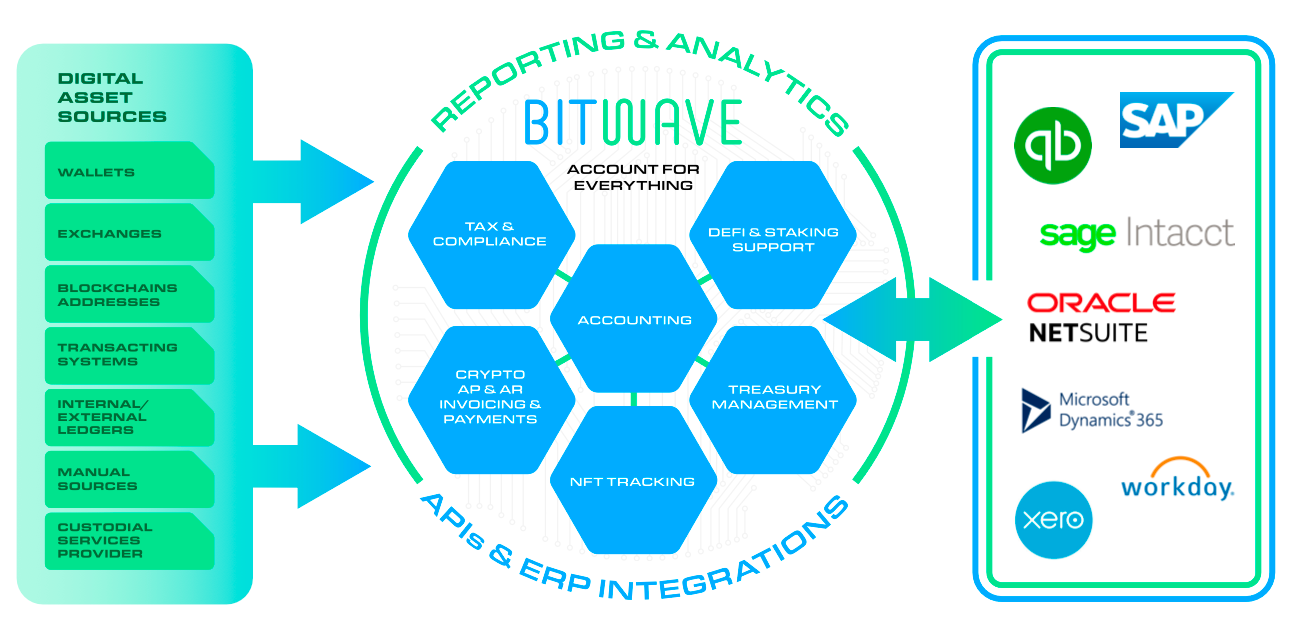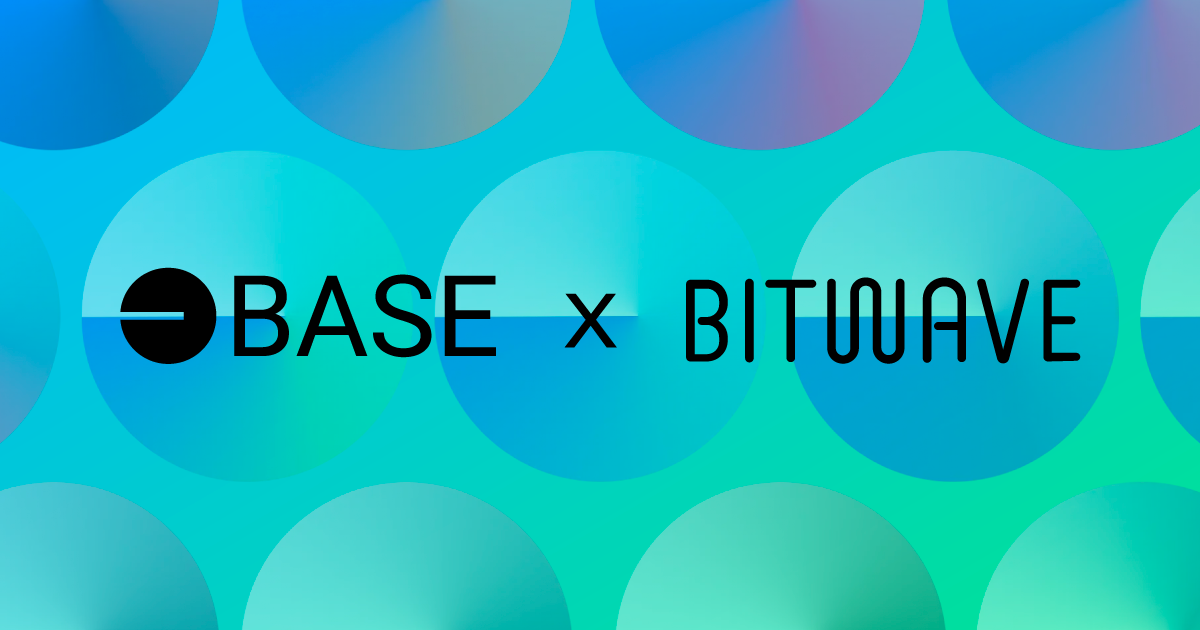
2022 was a pivotal year for enterprise adoption of digital assets, with major developments like Ethereum's switch to proof-of-stake and FThe Financial Accounting Standards Board (FASB) proposed new accounting rules for organizations holding crypto.
As businesses dive into the world of crypto, it's essential to have the right tools to manage financial reporting and compliance. But with so many options, how do you choose the best crypto accounting software?
Here, we discuss the 10 must-have features that every digital asset accounting and bookkeeping platform should have – and why Bitwave is the only solution that meets them, no matter where an organization falls on the digital asset maturity curve.
10 Essential Features for Digital Asset Finance Platforms
1. Integrations & Network Connectivity
One of the main benefits of a digital asset accounting solution is that it can automate the process of data collection and integration. This saves time and reduces the risk of errors, which can be costly in the highly volatile world of digital assets. In addition, a crypto accounting solution can help businesses comply with various regulations and ensure that their accounting practices align with industry standards.
Look for a solution that:
- Provides support for bulk wallets (e.g. 30k+ addresses)
- Provides support for a broad range of custodial wallets with wallet-by-wallet tracking
- Provides support for a broad range of crypto exchanges
- Can import off-chain data via API or CSV spreadsheet when an API is not available
- Can import Charts of Accounts, customer invoices, vendor bills, contacts, organizational metadata, etc., from your existing ERP system.
2. Extensibility: API Synchronization, Data Warehouse Access, and Data Reconciliation
Extensibility refers to the ability of a platform to be easily customized and adapted to work with other systems and support an organization's changing needs – and it is another essential feature to look for in an enterprise crypto accounting, tax, and compliance platform. This is particularly important when it comes to API synchronization with customer data and blockchain data, as well as access to a data warehouse.
API synchronization allows the platform to collect and integrate data from various sources, including customer databases, blockchain networks, exchanges (Coinbase, Kraken, Binance, etc.), and Custodians (Anchorage, BitGo, Fireblocks, etc.)
This allows businesses to have a comprehensive view of their assets and transactions, making it easier to track and manage them. In addition, API synchronization can help businesses comply with various regulations, such as those related to tax and accounting, like filling accurate and complete reports to the IRS, for example.
A data warehouse is a central repository where data from various sources can be stored and accessed. This allows businesses to easily analyze and process large amounts of data, can give organizations access to full historical data sets via BI tools, and, more importantly, can support real-time analytics with very large data sets without compromising speed.
Lastly, data reconciliation refers to the ability to reconcile off and on-chain data sources. It is one of the biggest challenges facing organizations as they adopt digital assets. A comprehensive crypto accounting solution should, at a minimum, have the ability to reconcile data from internal, external, and on-chain systems (sometimes referred to as triple-legged data reconciliation).
Look for a solution that:
- Can access customer data APIs (e.g., retrieve relevant transaction, exchange, and wallet data)
- Can access Blockchain data APIs (e.g., retrieve asset pricing data, token data, and smart contract data like verifying DeFi balances)
- Can push reconciled data back into ERPs and other ledgers
3. Asset & Token Support
Another essential feature of a crypto finance platform is that it can support multiple asset types. This allows businesses to hold and trade a variety of digital assets, giving them more flexibility and enabling them to take advantage of opportunities as they arise. In addition, the platform should have token standards for deploying smart contracts on the blockchain. This allows businesses to create and execute smart contracts in a standard, secure, and efficient manner.
Look for a platform that provides support for:
- Common token standards (e.g., ERC-20, BEP-20)
- Multiple token standards, with multiple fungible and nonfungible assets in one smart contract (e.g., ERC-1155, BEP-1155)
- Customized non-fungible and non-interchangeable token standards (e.g., ERC-721, BEP-721, Flow NonFungibleToken)
- The identification for NFTs with individual tokenID mappings (e.g., BAYC-1235)
4. Payment Processing
Enterprise-grade crypto accounting software needs to include robust payment processing functionality to support accounts payable and accounts receivable operations. For accounts payable, it is important for businesses to have the ability to pay vendors with digital assets. This can be done using a payment processing platform that allows businesses to send bulk payments with different amounts to different addresses. This saves time and reduces the risk of errors, making it easier for businesses to manage their vendor payments.
For accounts receivable, it is important for businesses to have the ability to bulk invoice customer wallets and to accept crypto payments from customers in multiple token denominations. This can be done using a payment processing platform that supports multiple cryptocurrencies and allows businesses to easily generate invoices and receive payments. This helps businesses streamline their accounts receivable operations and improve their cash flow.
Look for a solution that can:
- Segregate payment operational duties and responsibilities
- Bulk invoice customer wallets
- Can send bulk payments of different amounts to different addresses
- Can accept payment in crypto from customers in multiple token denominations
- Can automatically price payments to fiat value
5. Enterprise Reporting
The most fundamental feature of a crypto accounting platform is the ability to collect data from various sources, including blockchain networks, exchanges, and internal databases, to seamlessly integrate it into a general ledger or enterprise resource planning (ERP) system. This allows businesses to have a comprehensive view of their digital assets and helps them make informed decisions.
As previously discussed, one of the key features of an enterprise-grade crypto reporting platform is the ability to access data through APIs. This allows businesses to collect data from various sources, including blockchain networks and customer databases, and integrate it into their reporting system.
Another important feature of an enterprise-grade digital asset reporting platform is the ability to export raw data and run conditional scenarios. This allows businesses to analyze their data in more detail and explore different scenarios. Again, the ability to query data warehouses is a must. The platform should also be able to provide dashboard-level views of current balances and holdings. This makes it easy for users to see an overview of their assets and transactions at a glance.
Additional reporting capabilities to look for are the ability to run DeFi balance reports, daily balance reports, and journal entry reports in the target accounting system. In addition, the platform should be able to export ledger reports of transactions, providing businesses with a complete record of their digital asset activity.
Finally, an enterprise-grade digital asset reporting platform must be able to intelligently roll up (or aggregate) thousands of micro-transactions into single summarized transactions on an hourly basis. This simplifies the accounting and tax workflows, making it easier for businesses to manage their data.
Look for a solution with the ability to:
- Ability to access reports through API
- Export raw data from reports via JSON responses or CSV files
- Run conditional scenarios and export raw data reports
- Query data warehouse in real-time through BI reporting
- View current balances and holdings through an enterprise dashboard
- Run reports on granular criteria (by wallet, by date, etc.)
- Run DeFi balance reports and infer treatment
- Report daily balance of all accounts
- Export raw transaction data
- Export ledger report of transactions with running balance
Bitwave: The best – and only – enterprise-ready crypto accounting software
Bitwave is the perfect solution for organizations that prioritize financial reporting and compliance. With enterprise-grade features like single-sign-on and field-level role-based access control, Bitwave makes it easy to manage accounting roles and responsibilities. With Bitwave, you can practice mark-to-market accounting with precision across your entire inventory of digital assets, streamline your bookkeeping, and optimize your tax strategy.

Plus, with comprehensive integrations with Quickbooks, NetSuite, Sage, and Xero, as well as support for over 200 blockchains, exchanges, custodians, and DeFi protocols, Bitwave is the go-to choice for sophisticated financial organizations. And with our unparalleled support, including deployment and integration services, custom reporting, and expert advice, Bitwave is the ultimate solution for managing your digital assets.
Stay tuned for part two of this series, which will cover the remaining five must-have features of an enterprise crypto accounting software solution.
Want to learn more? Schedule a call today.

Disclaimer: The information provided in this blog post is for general informational purposes only and should not be construed as tax, accounting, or financial advice. The content is not intended to address the specific needs of any individual or organization, and readers are encouraged to consult with a qualified tax, accounting, or financial professional before making any decisions based on the information provided. The author and the publisher of this blog post disclaim any liability, loss, or risk incurred as a consequence, directly or indirectly, of the use or application of any of the contents herein.







